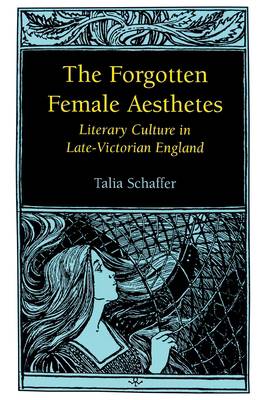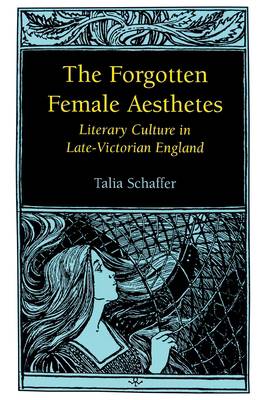
- Retrait gratuit dans votre magasin Club
- 7.000.000 titres dans notre catalogue
- Payer en toute sécurité
- Toujours un magasin près de chez vous
- Retrait gratuit dans votre magasin Club
- 7.000.000 titres dans notre catalogue
- Payer en toute sécurité
- Toujours un magasin près de chez vous
Description
Most critics of aestheticism focus on the Yellow Book, the glossy Victorian journal with the shocking yellow cover that counted among its contributors Aubrey Beardsley and Max Beerbohm. But one of the best-known aesthetes, Oscar Wilde, launched his own magazine, the Woman's World. The audience for Wilde's magazine reveals another side of the aesthetic movement that has been largely forgotten.
Every now-canonical male aesthete once competed with what Talia Schaffer calls the female aesthetes, whose critical and popular success made them formidable contemporaries. Not only did these women make significant contributions to the development of feminist ideologies; they pioneered new literary strategies that were incorporated by their canonical successors.
Schaffer analyzes writers who have never been considered together, including Lucas Malet (Mary Harrison), Ouida (Marie Louise de la Ramée), Alice Meynell, Rosamund Marriott Watson, Una Ashworth Taylor, Elizabeth Robins Pennell, Mary and Jane Findlater, and John Oliver Hobbes (Pearl Craigie). These women used aestheticism to forge a compromise between the two models of female identity available to them--the New Woman and the Angel in the House. They developed plots, ideas, and styles that would later be adopted, parodied, or revised by canonical writers such as Oscar Wilde, Virginia Woolf, Thomas Hardy, and Henry James. They used the "pretty" language of aestheticism as a strategic cover behind which they could attempt radical experiments, many of which prefigure modernist innovations.
Recovering the lost work of the female aesthetes forces us to reconsider the central tenets of late-Victorian literary history.
Spécifications
Parties prenantes
- Auteur(s) :
- Editeur:
Contenu
- Nombre de pages :
- 312
- Langue:
- Anglais
- Collection :
Caractéristiques
- EAN:
- 9780813919379
- Date de parution :
- 29-04-00
- Format:
- Livre broché
- Format numérique:
- Trade paperback (VS)
- Dimensions :
- 155 mm x 230 mm
- Poids :
- 462 g







